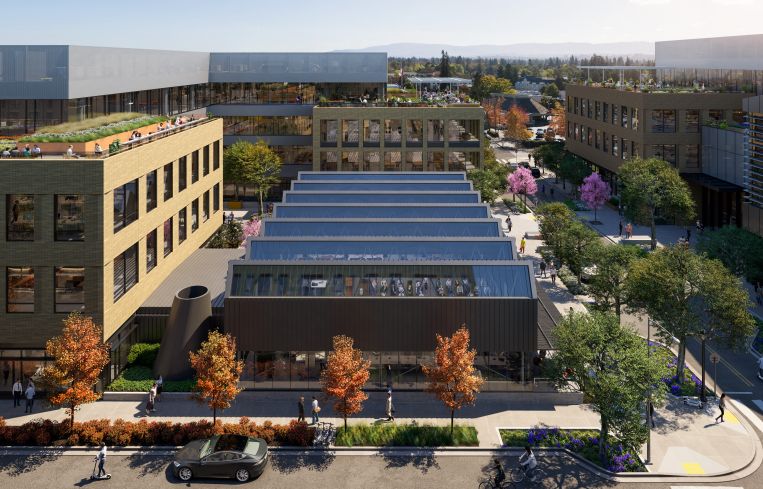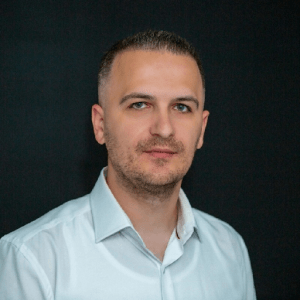Kode Labs’ Edi Demaj On Proptech and Life Sciences Development
Few proptech firms have attempted major forays into the biotech field, though Kode’s recent partnership with IQHQ might change that
By Philip Russo April 1, 2025 9:00 am
reprints
Few proptech companies have attempted to enter the rarefied technological world of the life sciences property development sector.
Last month, however, Detroit-based Kode Labs, a global provider of advanced smart building technology, entered into a strategic partnership with IQHQ, an owner and developer of world-class life sciences districts. Their partnership announcement may herald a new wave of proptech-life sciences associations.
The collaboration calls for IQHQ to integrate Kode Labs’ technology across its under-construction and operating portfolio to reduce operating expenses, aggregate building data, optimize energy management and provide portfolio-level insights. In kind, data-centric operating system Kode OS will help IQHQ centralize its building systems into a user-friendly interface, with the goal of streamlining management processes and reducing operational costs.
Kode Labs’ Edi Demaj, who co-founded the proptech startup with his brother Etrit, spoke to PropTech Insider in late March about entering the life sciences property development market and the challenges of matching the vertical’s high-touch, high-risk and high-demand requirements.
This interview has been edited for length and clarity.
PropTech Insider: Kode Labs in March announced a partnership with IQHQ. What does this mean for the interaction between proptech and life sciences properties?
Edi Demaj: IQHQ is this innovative life sciences developer that has been looking to essentially be a leader in this space. They’re building either brand-new buildings or renovating new ones. They’re finding different assets across the U.S., and one of their goals was that they didn’t want to be just another life sciences developer. They want to provide a unique product. They have an incredibly talented team and looked at a lot of different proptech provider options to find one that fits their vision and mission.
After a long, detailed process, they landed on, “We want to partner with Kode Labs as our go-to smart building platform.”
Why did they choose your company?
What we offer is not a transactional relationship, where you sell them this thing, and they go about their business and onto the next one. It’s a true partnership, as in we’ve built a platform that is modular and flexible to work in any vertical within the built environment. It isn’t built for a specific vertical. It’s also built for all systems and softwares within the built environment.
We’ve partnered to understand everything that they’re doing and where they’re trying to go. We’re coupling that with the technology and the platform we’ve built to essentially provide this unique product that they can now use at scale across their entire portfolio to help do a few different things.

What are those things?
One, operationally for themselves, to be more efficient, more data driven and on point, which is literally the type of organization they are for their tenants. And to be able to provide a product that doesn’t silo any one of their tenants. Rather, it’s an open product that not only makes life easier for IQHQ and the companies that manage their portfolio, which in this case I think is CBRE, but also provides a product that allows both IQHQ and their tenants to do some of the things from the very basics of being able to procure systems in an open manner all the way to being able to track and actually have automated workflows.
Also to provide a comfortable space for the people that work in their buildings, and to provide them with the tools that make it easier to manage these very high-touch things.
As you know, life sciences is a different kind of beast. You’re talking about labs and all sorts of different uses within these buildings. This is essentially a way for them to take the traditional model of life sciences, and depending on the region — I may be working with Siemens here, and Honeywell there, and Johnson Controls there — and saying, “Look, we can work with whoever provides the best product for that specific use.”
It’s similar to what other industries are doing. I can use Tesla in the automotive space and all the things they’re doing with software, all the way to Salesforce and what they did to sales and CRM. How do we bring that sort of experience to a vertical within real estate and to the life sciences space? The built environment still operates like it’s 1995.
How many properties does IQHQ own and operate in the U.S., and are you working on all of them?
The number is changing all the time, because they’re constantly on the move, but I think the total number of buildings is 30 or 50 across the U.S. We are working with all of them.
How did you approach them? Were you mostly working on office buildings? In the evolution of Kode Labs, how did life sciences enter the picture?
We’ve been working in all different verticals, from offices to data centers to medical spaces, and
life sciences was a vertical that we have. We’ve had multiple conversations with clients, owners of mixed-use properties, life sciences being one of them. But they’re not life sciences developers, per se. It’s just that they have a large portfolio and maybe a handful of buildings that are for life sciences.
What made you feel that IQHQ would be a good client for you?
When you enter a new vertical, you want to partner with the ones that you think are really going to move the needle. And, in our conversations with a bunch of them, we felt that IQHQ, frankly, was the one that could move the needle in a way that we’d like — the way we disrupted other spaces in other verticals within the built environment. We made them our focus for life sciences.
It doesn’t mean that in the future we won’t work with others, but right now it’s IQHQ. We’re laser focused on making sure that they are the portfolio that ultimately provides the best experience and is the smartest, most efficient portfolio in that vertical.
What percentage of Kode Labs’ business is made up by the life sciences vertical?
Today, it’s less than 3 percent of our business, but we expect that as we enter into this and grow it’ll likely reach over the next 24 months or so as much as up to 10 percent of our business.
Are you seeing other proptech companies finding the same opportunity in the broader vertical of life sciences?
Yes, I believe so. There are other use cases for proptech companies, such as indoor air quality, sensor companies or occupancy sensor companies, or leak detection, which is a huge deal. As the space continues to grow, I think there will be quite a bit of opportunity not just for Kode Labs, but also other proptech companies within this space, but we’re going fast.
How do you adjust your technology to the life sciences’ high level of technology and operations? Does it require a different set of algorithms, or is it still basically the same work that you do?
The core is very similar to what we do across the entire built environment, because there’s a core component that applies to all buildings. As you get into workflows and some of the other things they need to do, you realize these buildings are set up a bit differently than traditional office buildings, like retail or mixed-use.
But the way that makes our platform unique — and this isn’t meant to be, like, a sales pitch — is that we’re the only company, the only platform, in the world that works in literally every vertical except for single-family homes. There’s not another platform that touches every single vertical in this space. There’s also not another platform that has 200-plus different integrations across different sets of systems in the world.
We’re not life science specialists per se, but we have the tech and flexibility to listen, learn, and then configure the platform to address the needs and the use cases that are very specific to life sciences and don’t apply to office or to data centers.
Does this partnership open up international work in the vertical for Kode Labs?
Absolutely. From Australia to all over North America and the U.K. It is also a huge deal around Europe as well. But our primary growth that we’re seeing, in life sciences and just overall, is in English-speaking countries.
What’s your advice to proptech companies looking to engage with the life sciences sector?
I would say it is quite difficult. The core is the same, but you have to spend the time to truly listen and understand how it works in detail. First, these are 24/7 operations in a lot of cases, unlike other verticals where they work maybe 10 or 12 hours a day.
No. 2, these are basically medical spaces. So you’re talking about high touch, high risk. Your tech has to really be able to scale. It has to be able to work at enterprise level. It isn’t a space that you enter in the early stages of your proptech company’s life. In my opinion, it is a space that you mature and grow into, not a space that you start with normally.
Kode Labs was founded in 2017, and now you’re entering a new vertical. How’s that affecting your company’s finances?
To give you a little bit of background here, we’re the only proptech company that has scaled to this space that has been profitable every year since our founding. You see companies that go and raise money. Nothing wrong with that. But we didn’t raise any outside capital for five years. Then the last two years we’ve raised some money. It’s all just preparing across the entire team to make sure that you’re not stepping into something that could backfire for your team and your clients. You want to make sure you’re here to support them for the long run rather than, “We’re not in this just to grow and exit in three years. We’re here to stay here for a while.”
Similar to other spaces, life sciences is also a vertical within the built environment that has to step up to the game. It’s not just building the brick and mortar and handing it over. They have to hand over more than that to make life easier for their tenants. Otherwise, they’ll fall behind, similar to what has happened to other verticals, whether it’s residential, commercial, retail, you name it. And I think life sciences is catching up to office, or these other categories, with regard to the built environment.
Philip Russo can be reached at prusso@commercialobserver.com.



